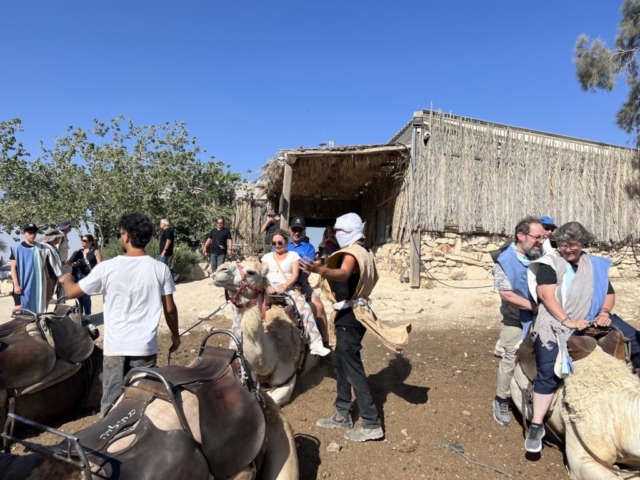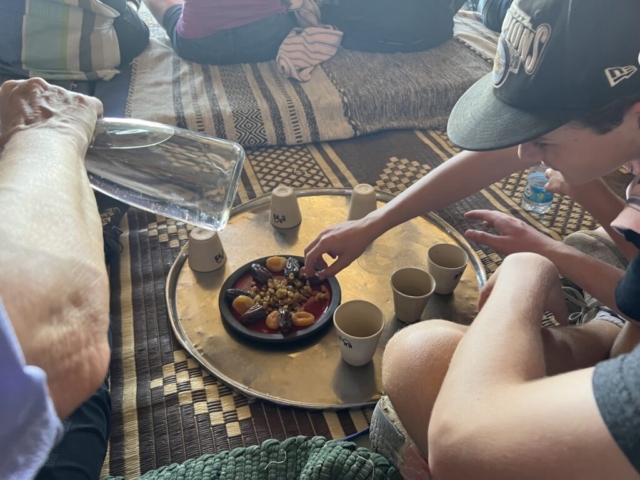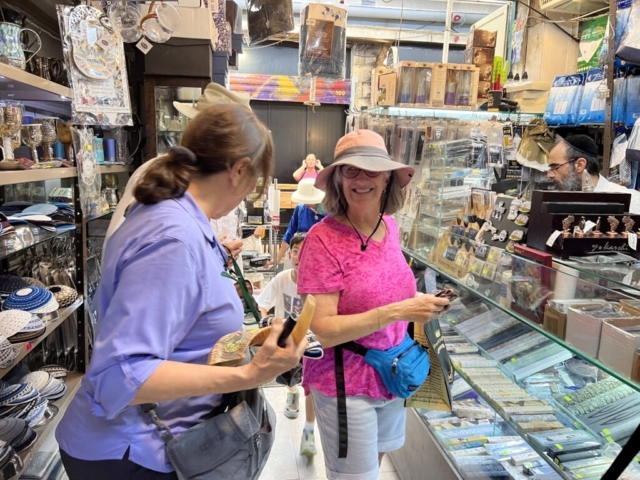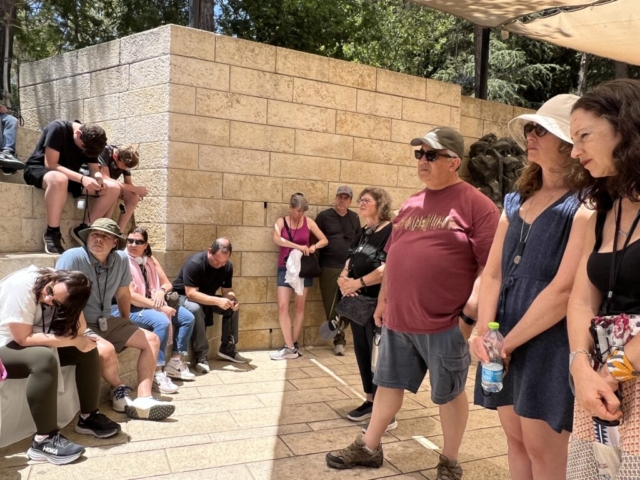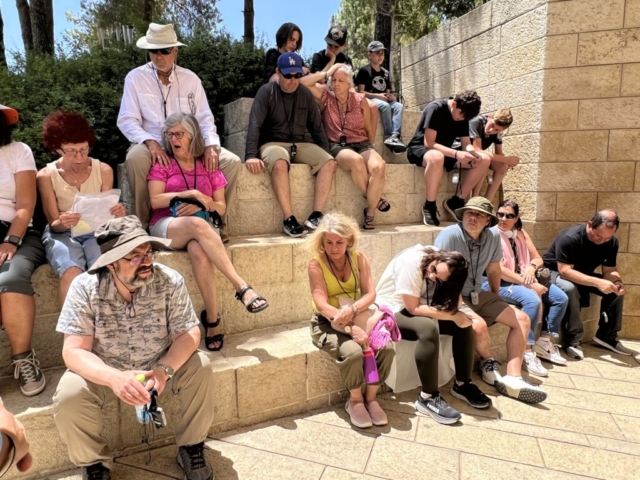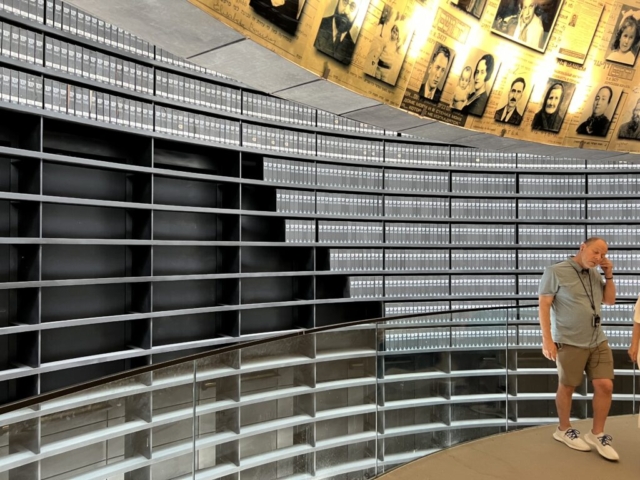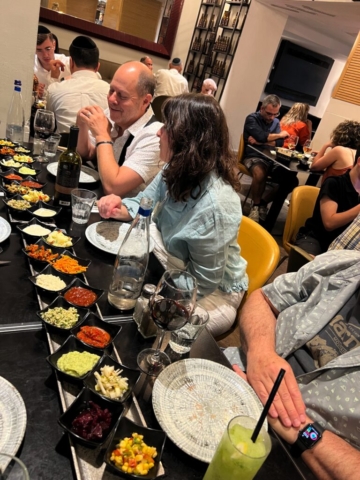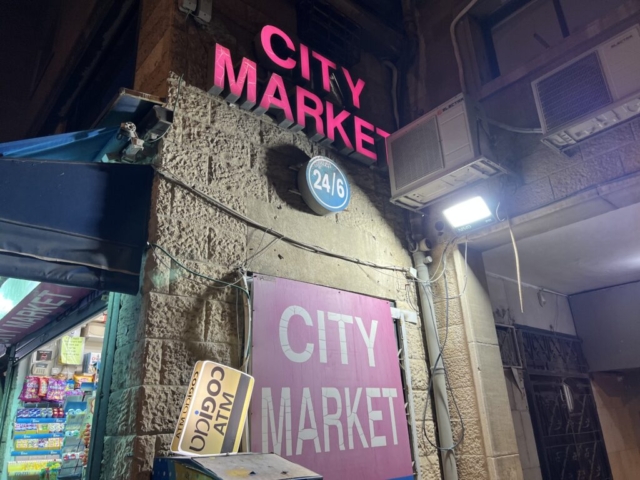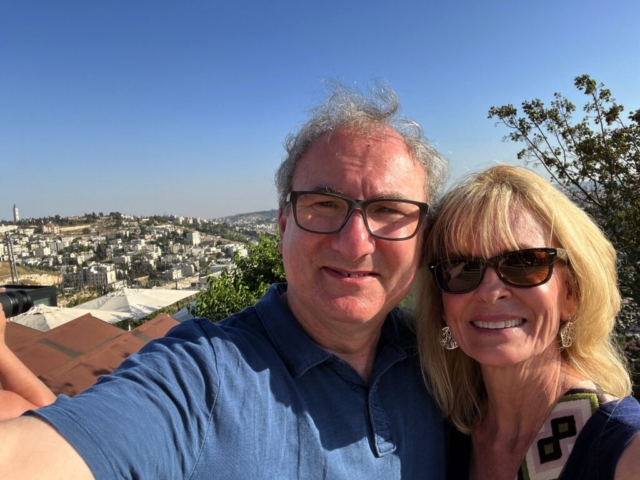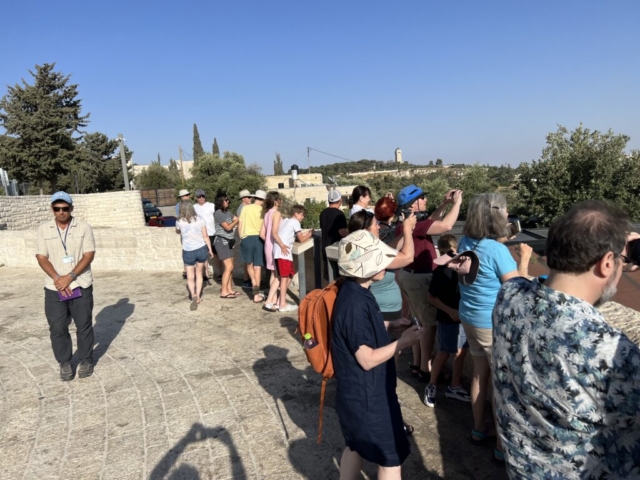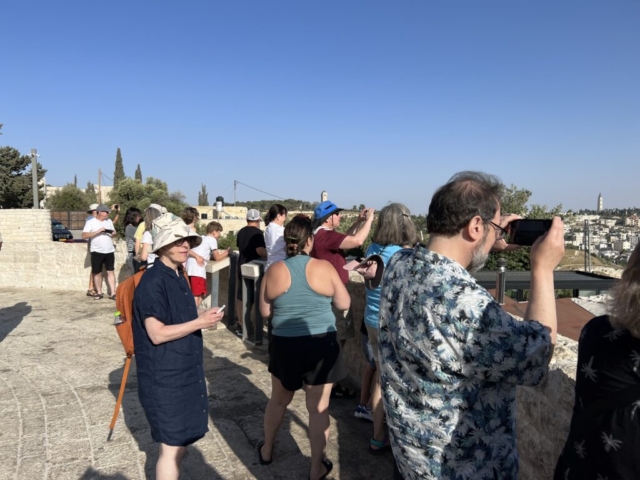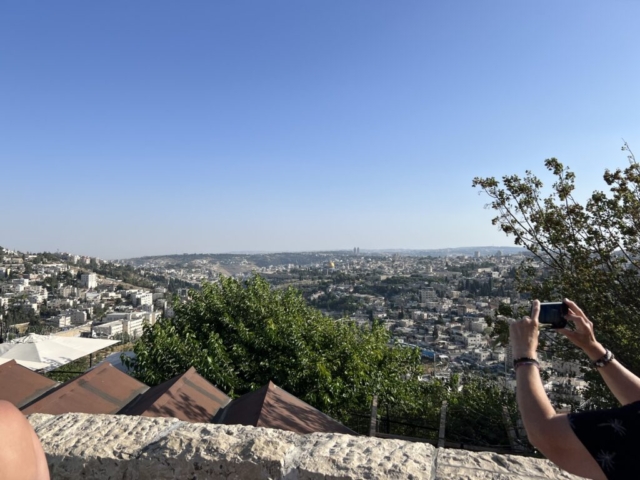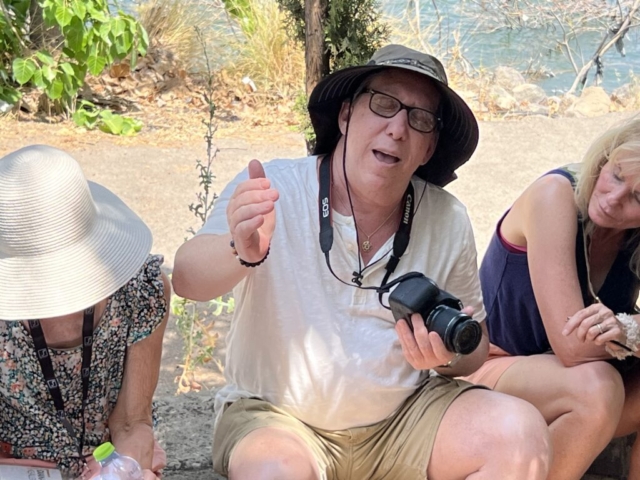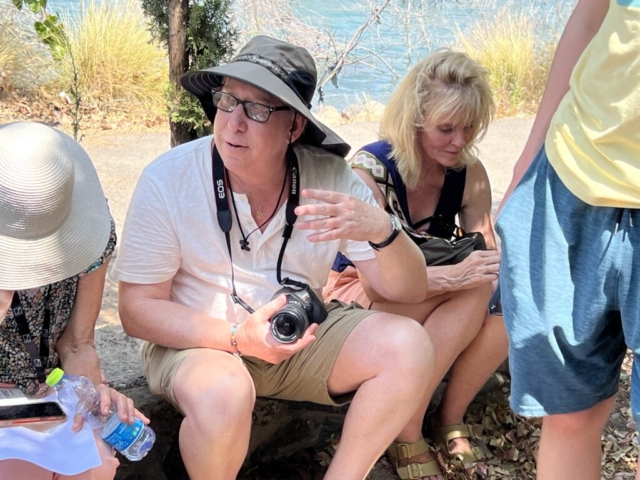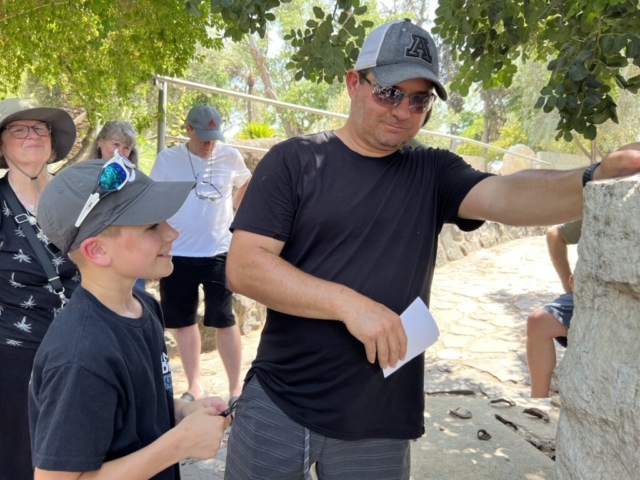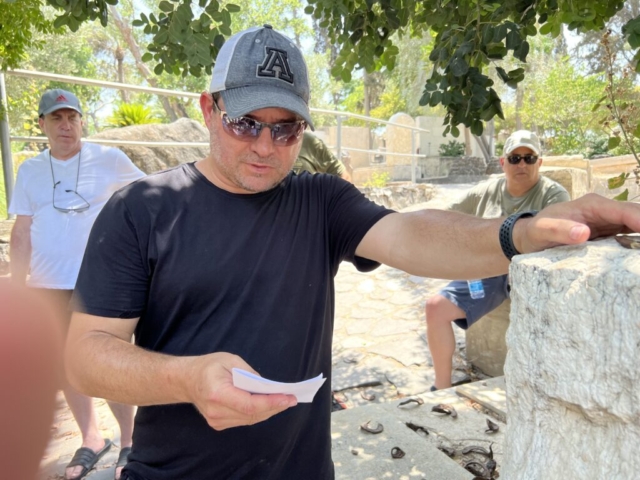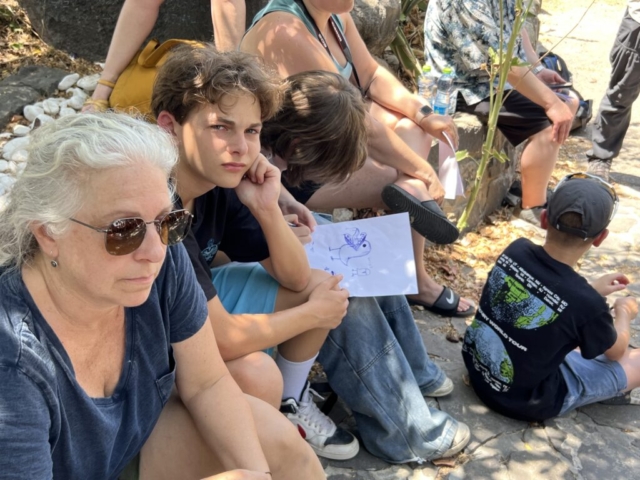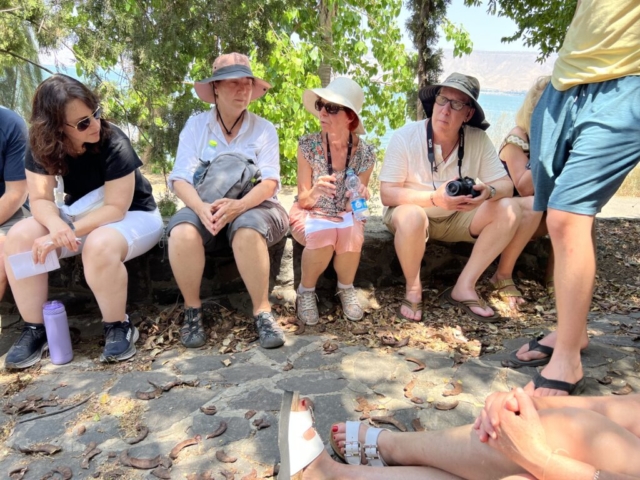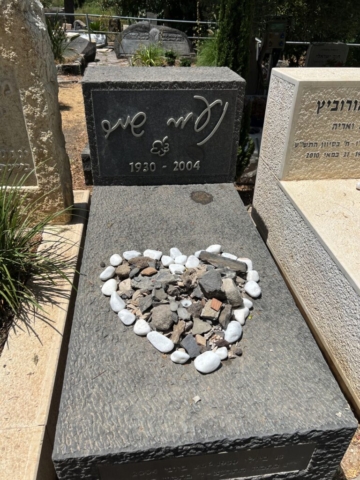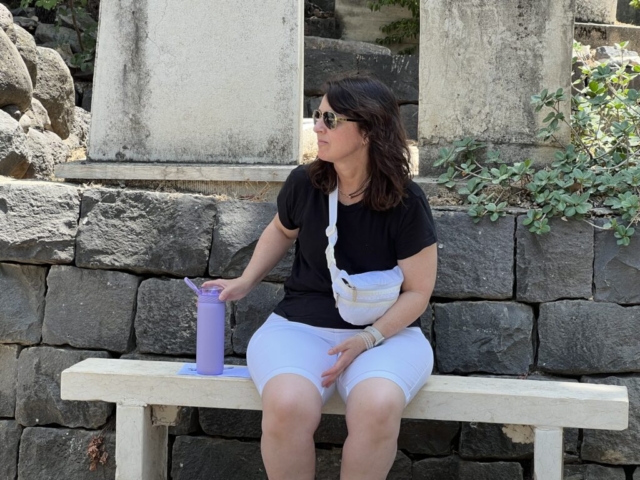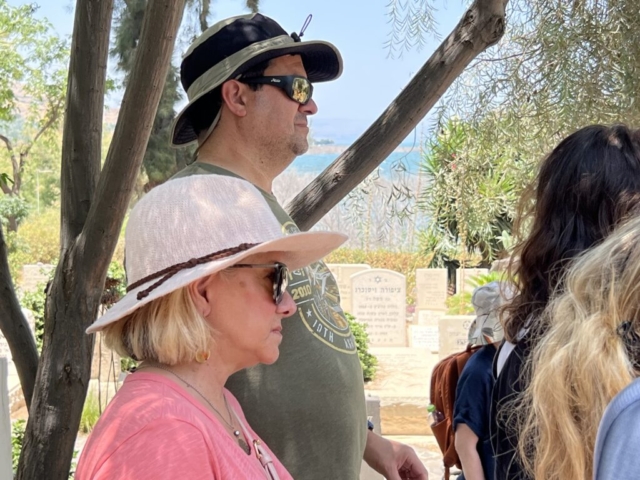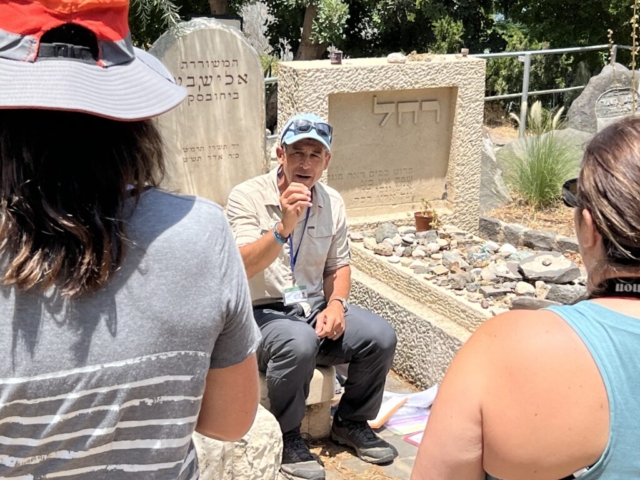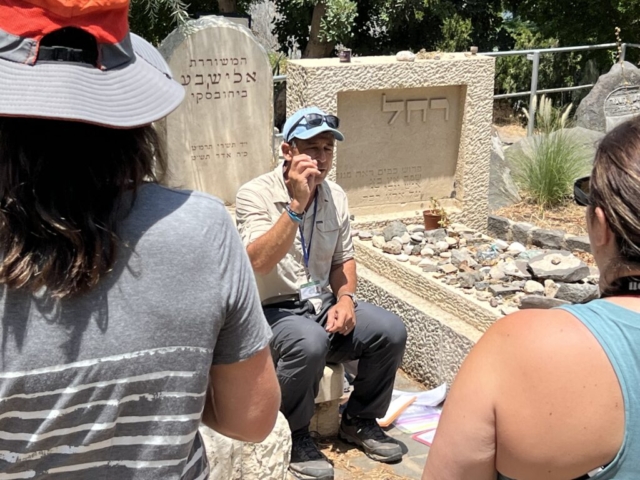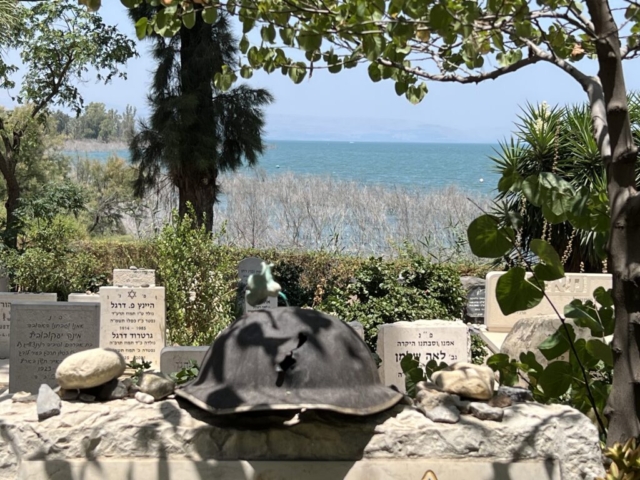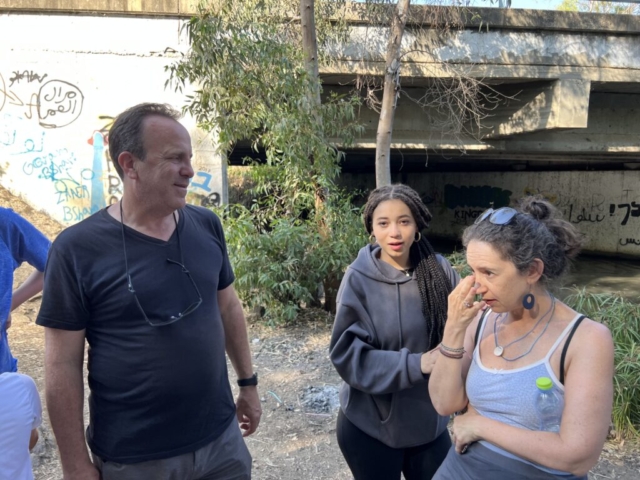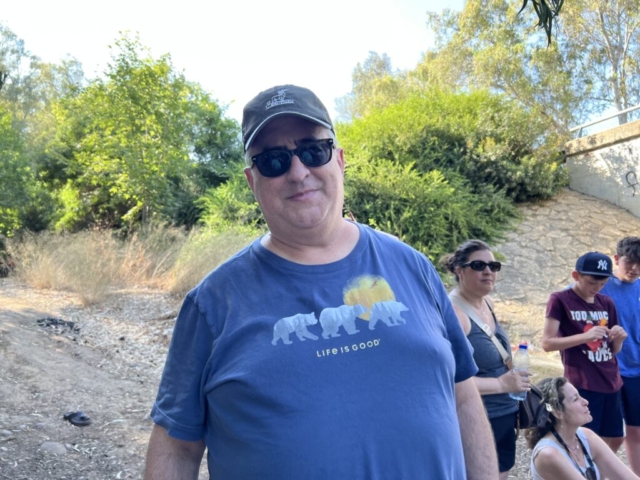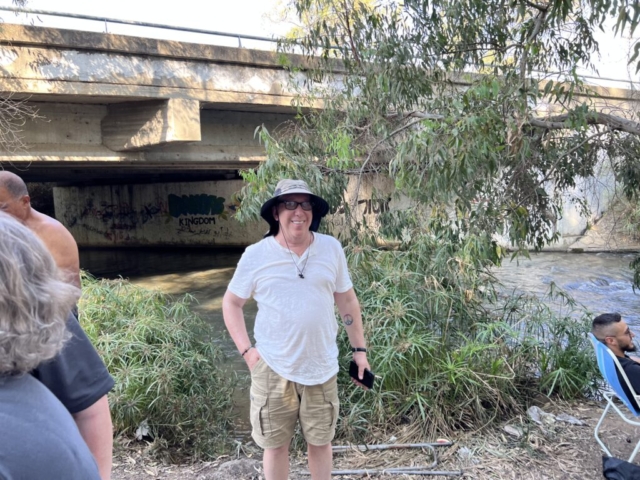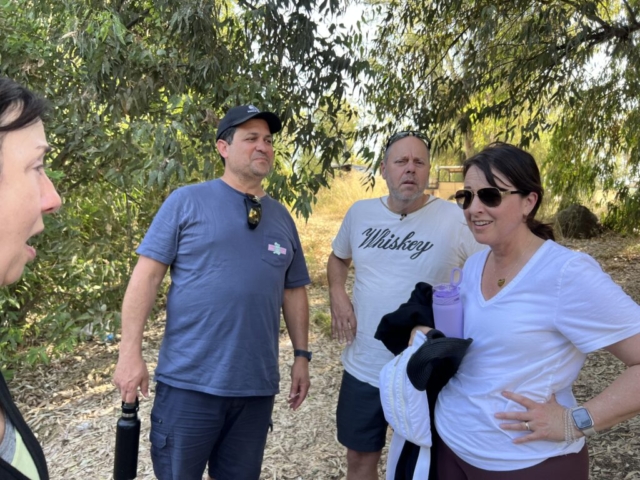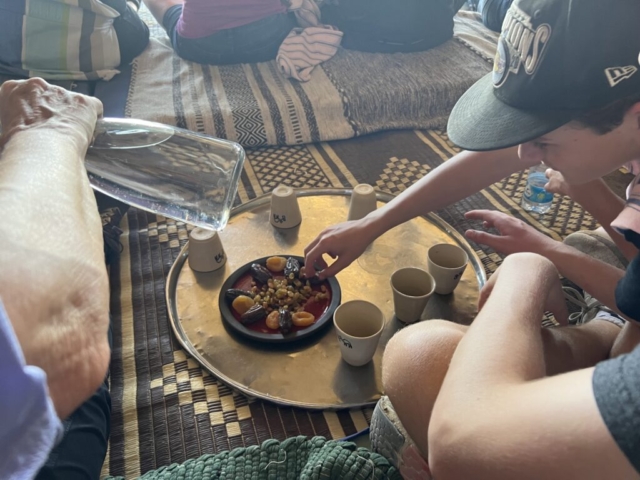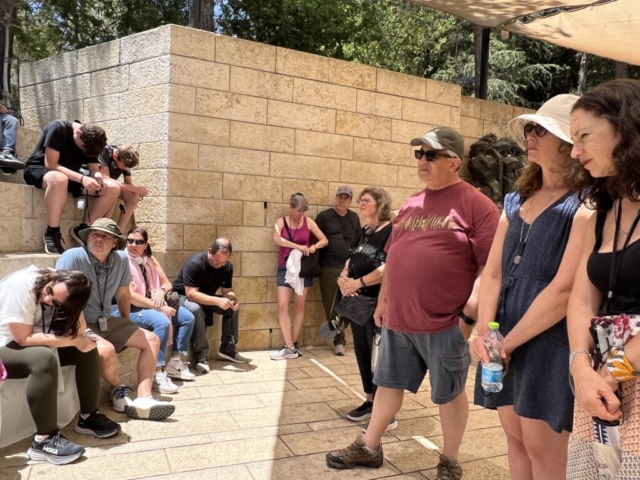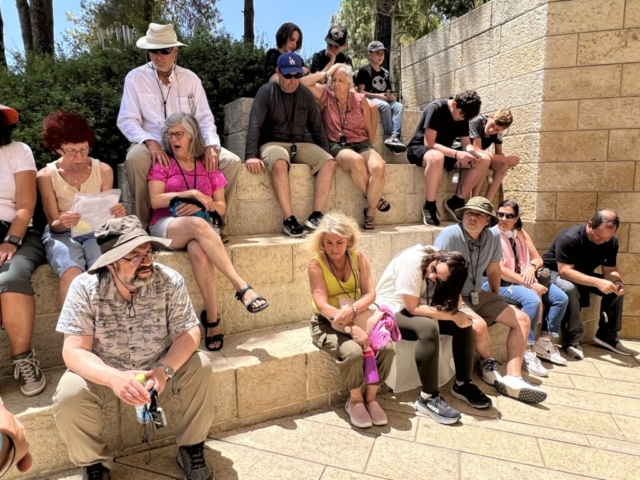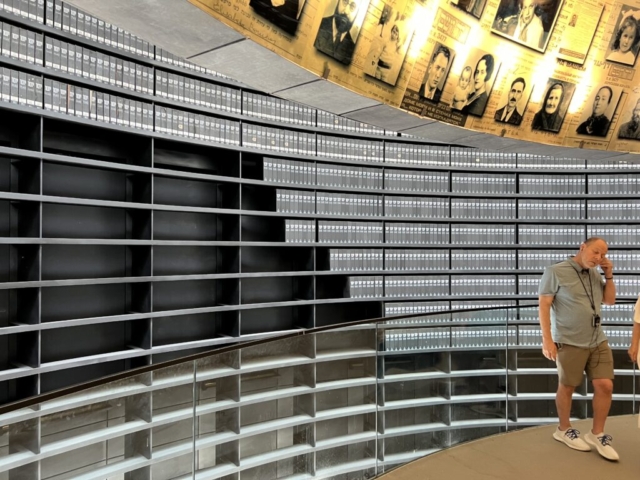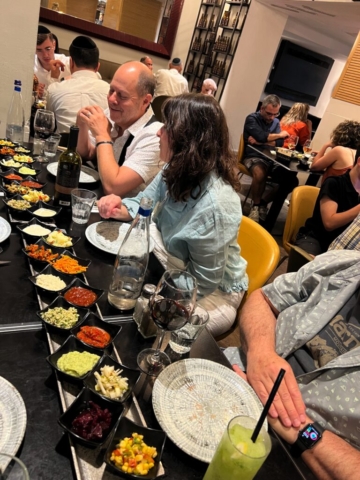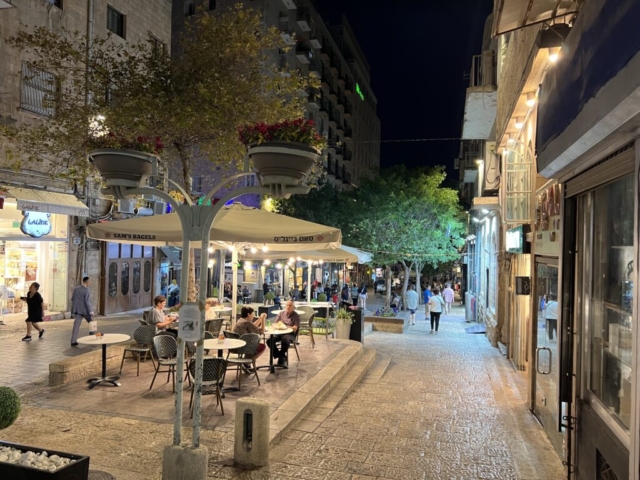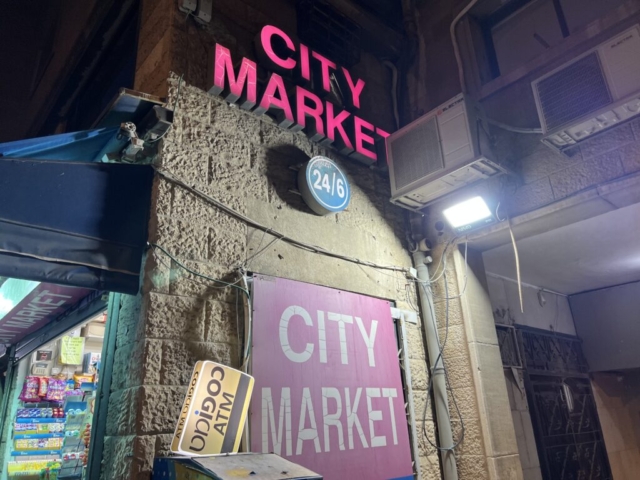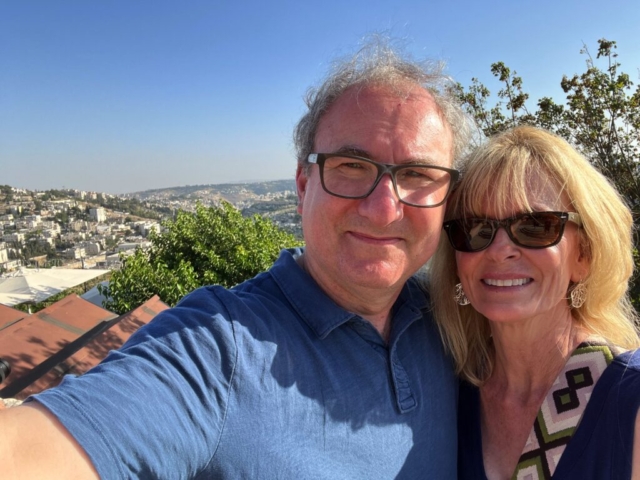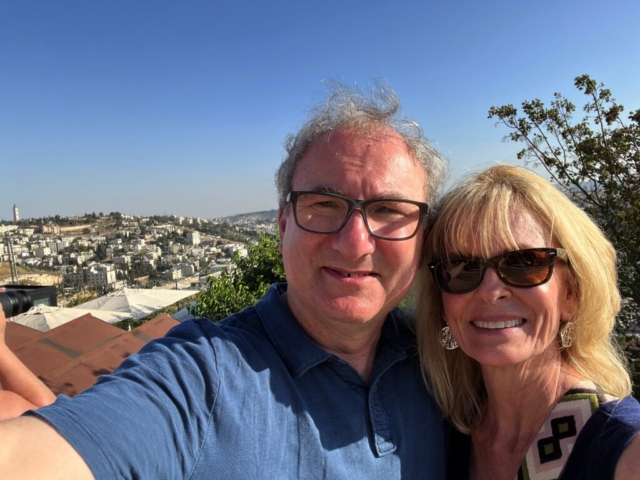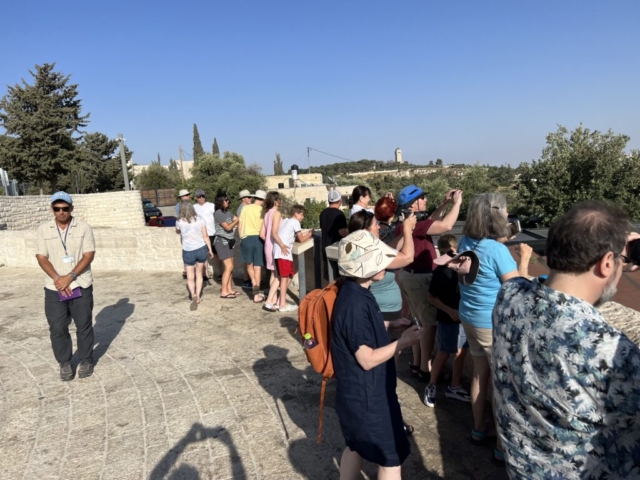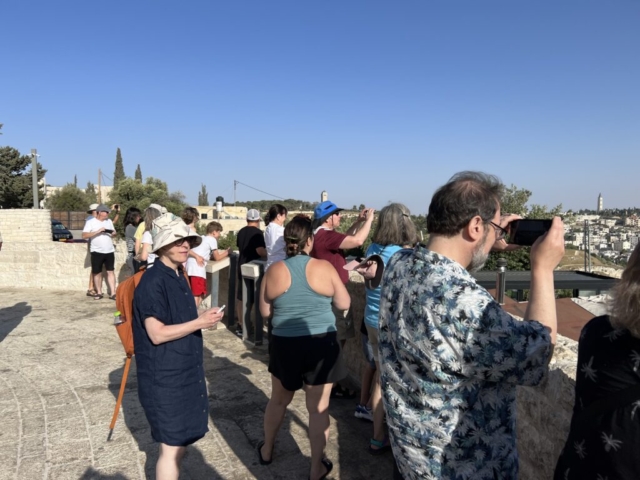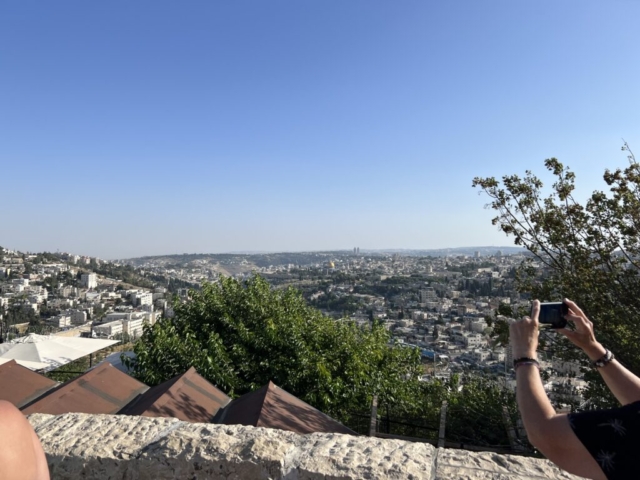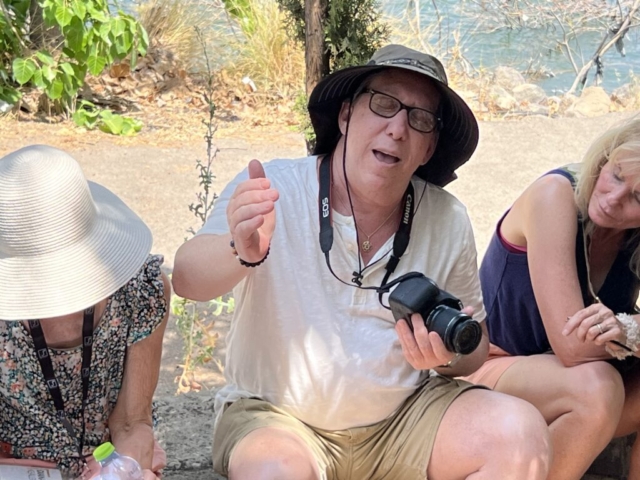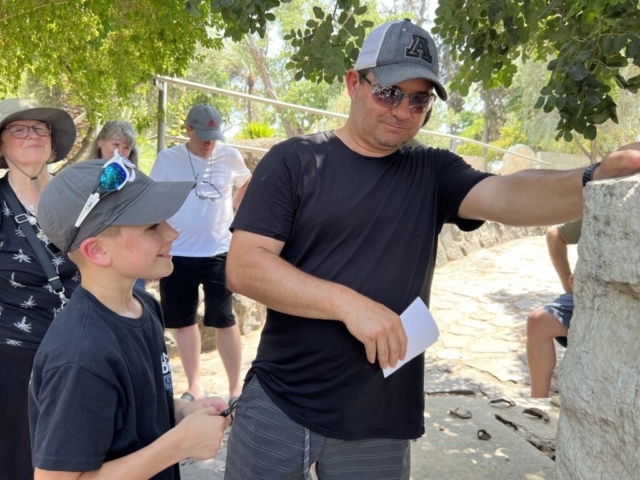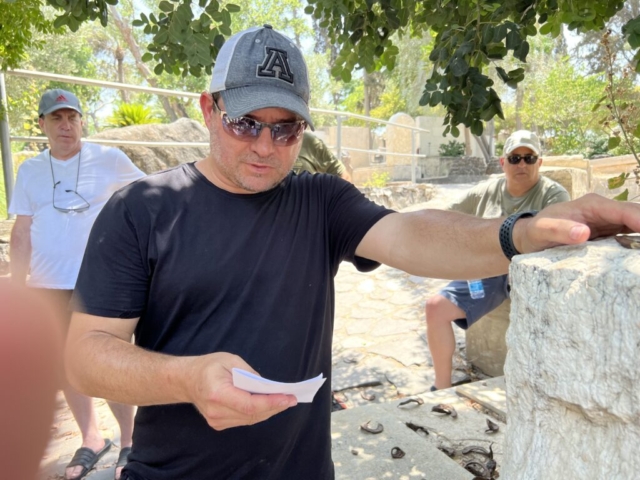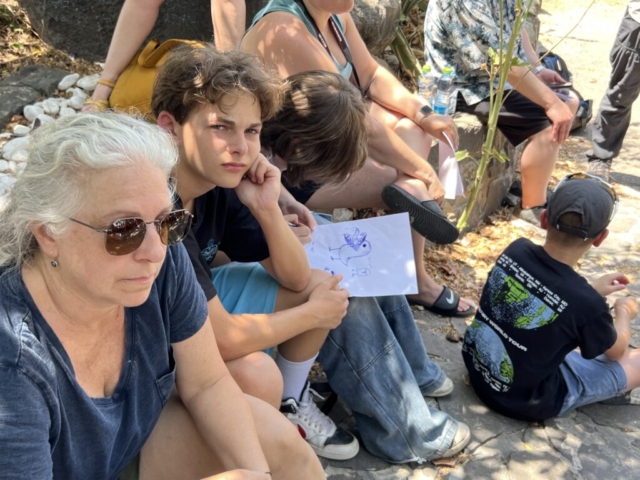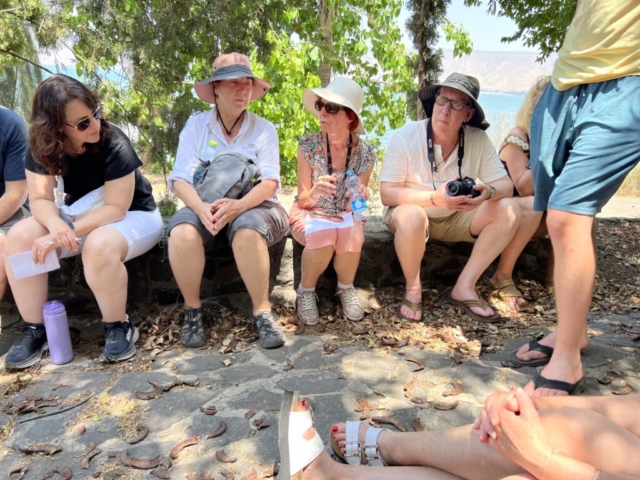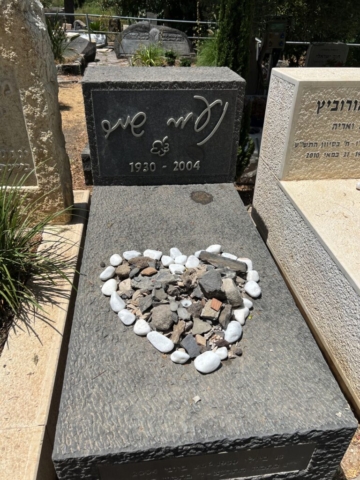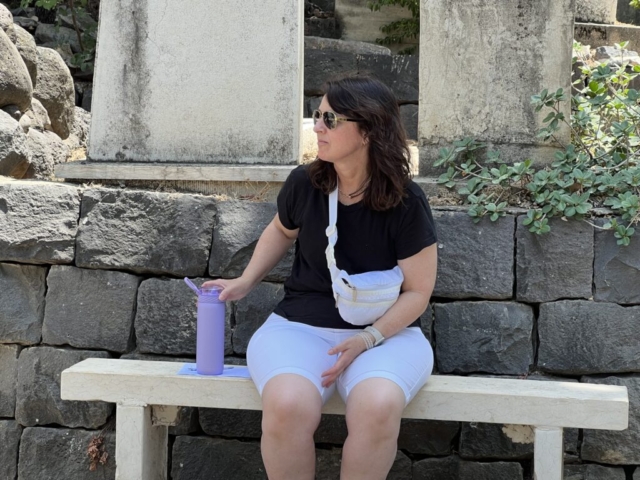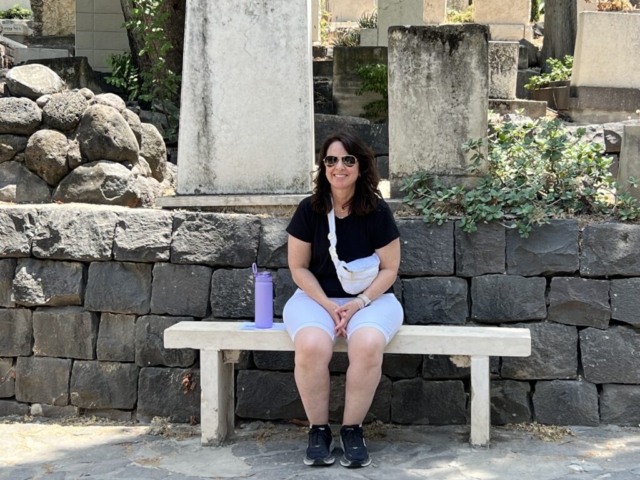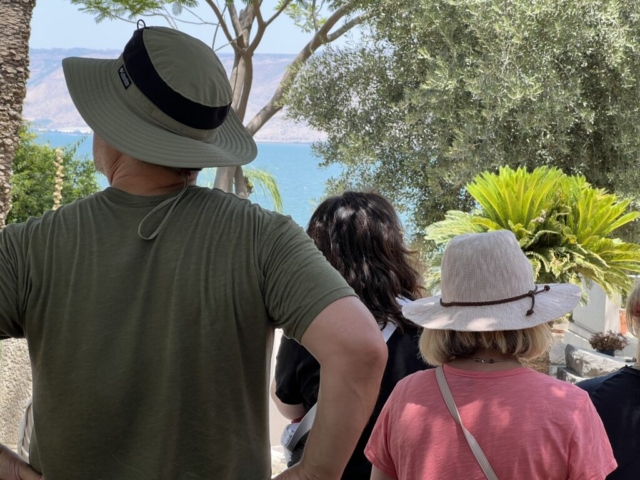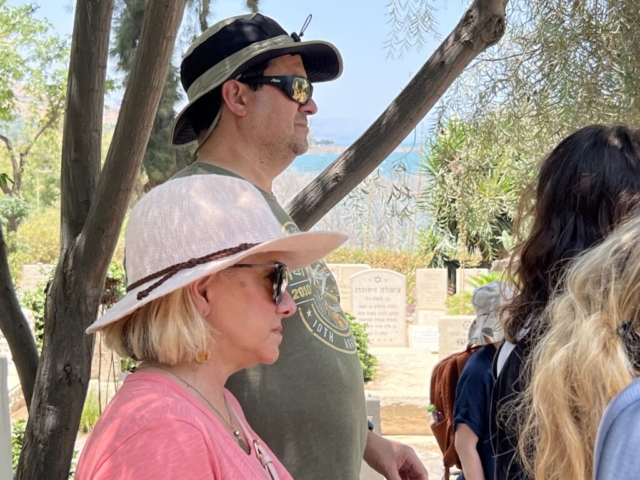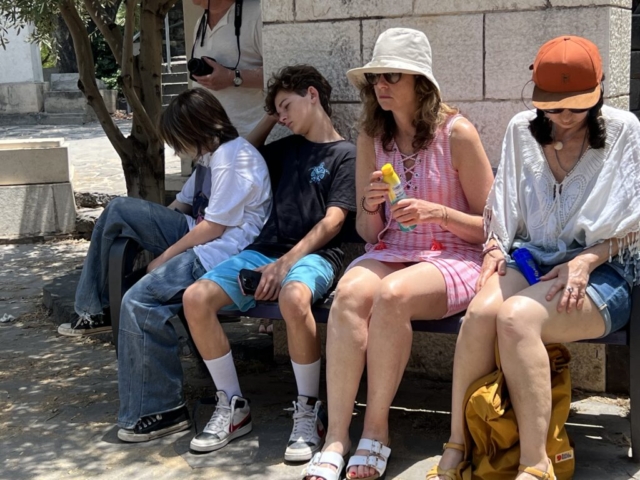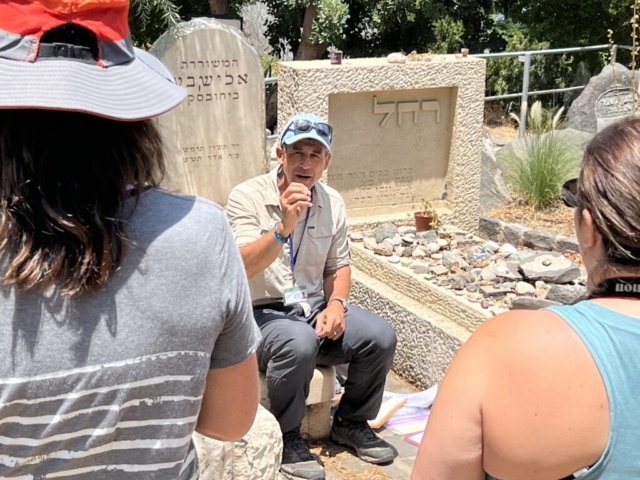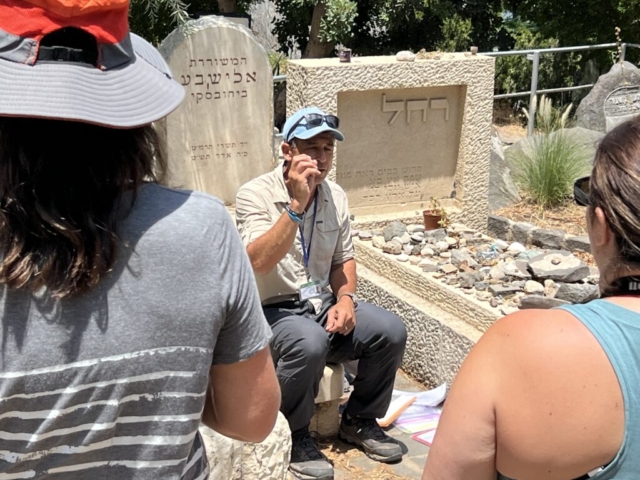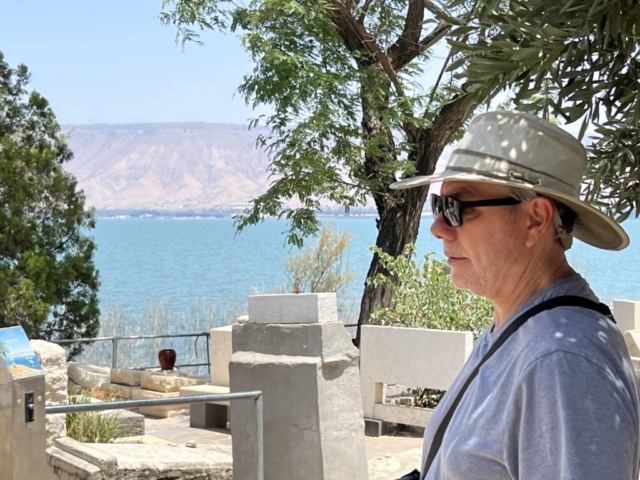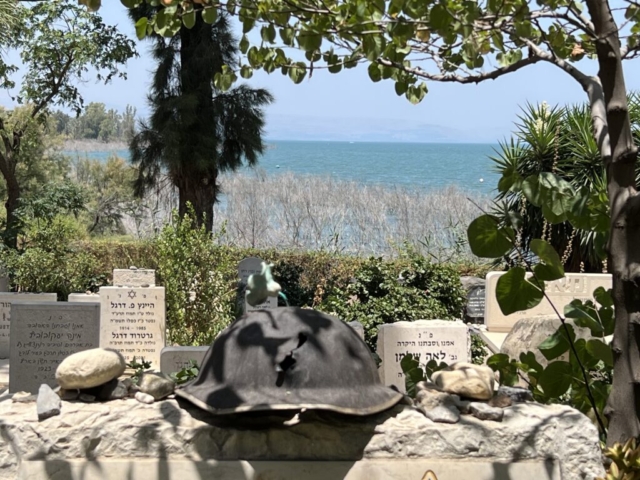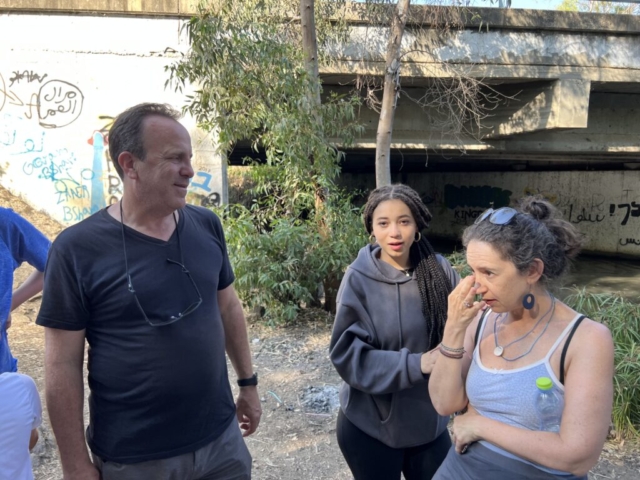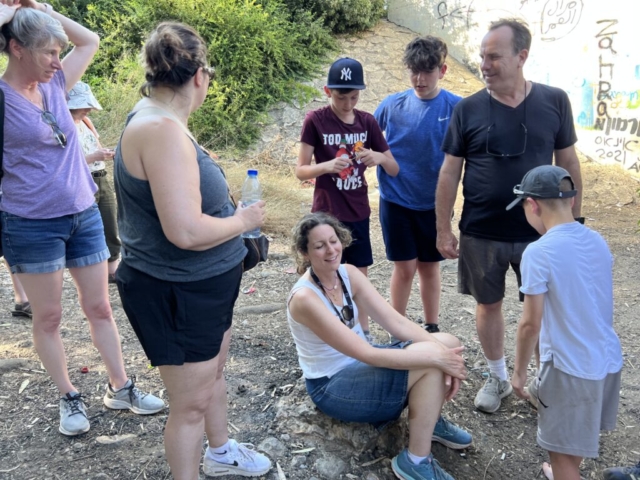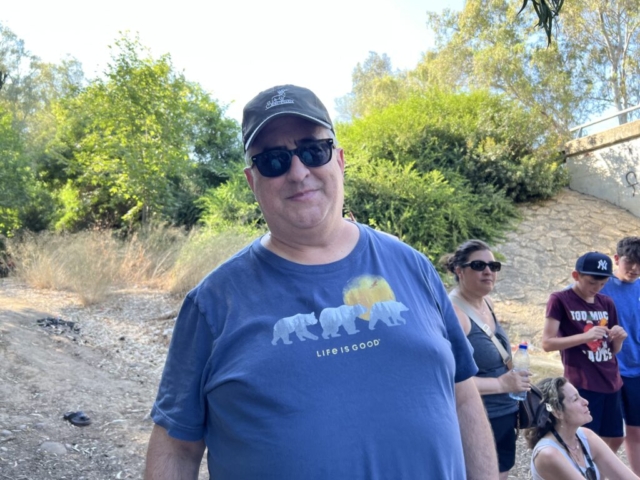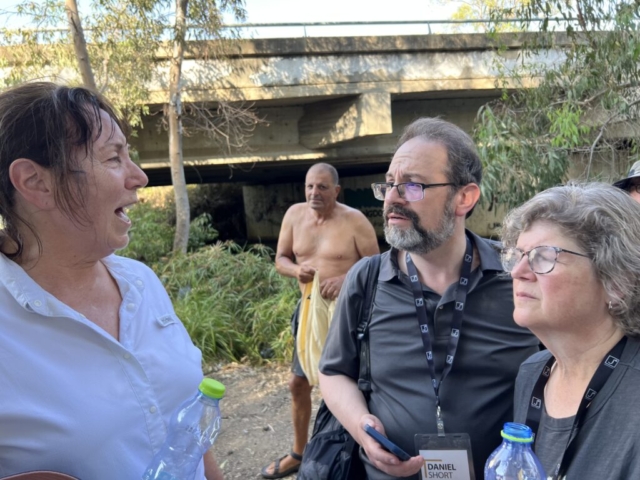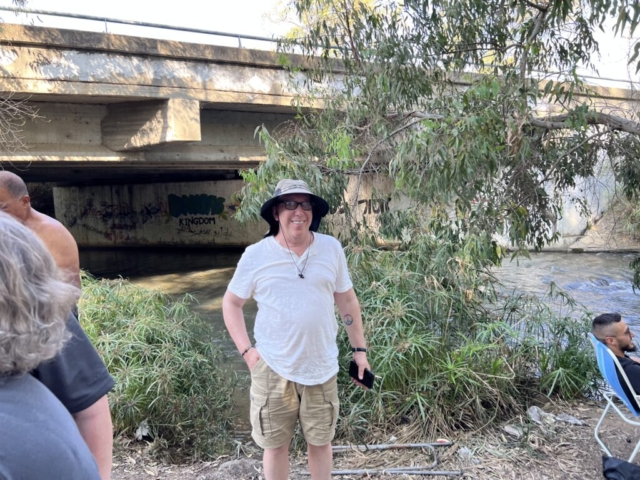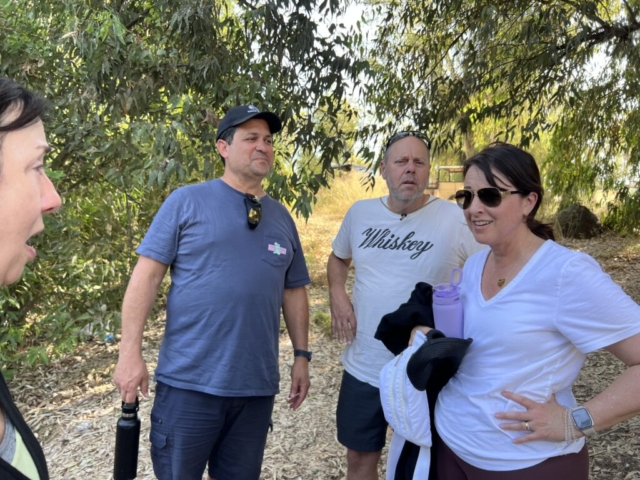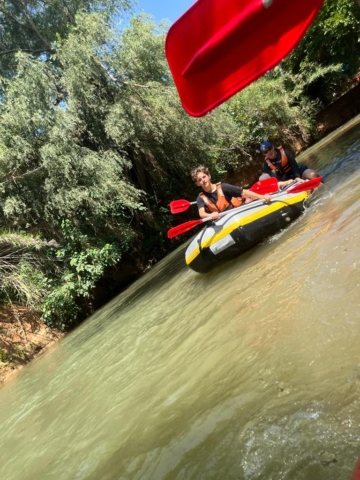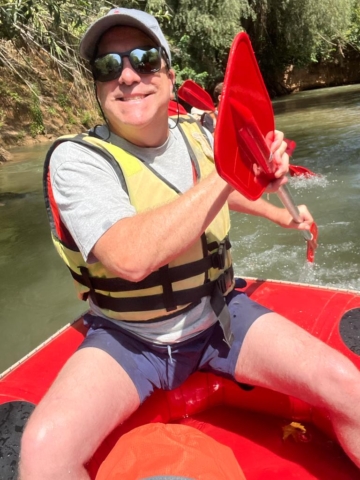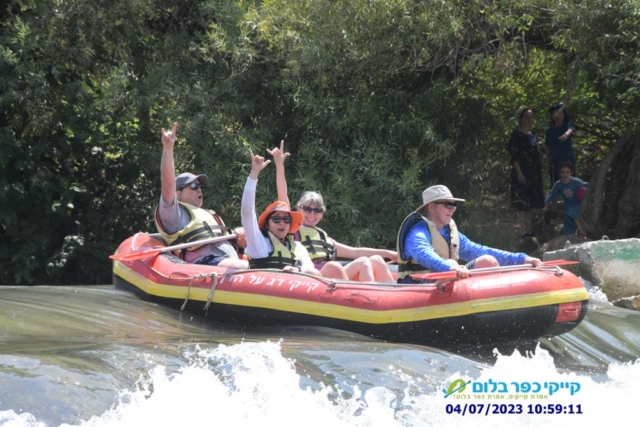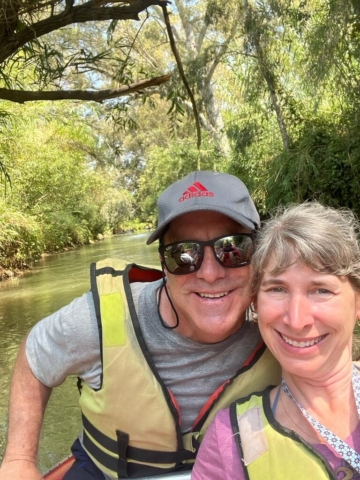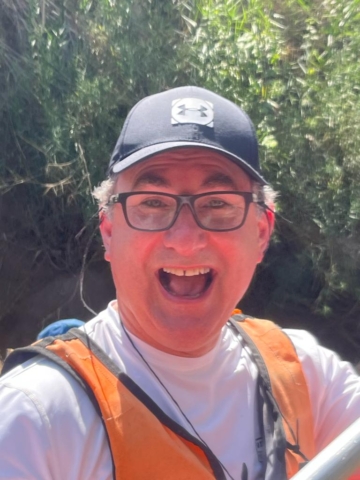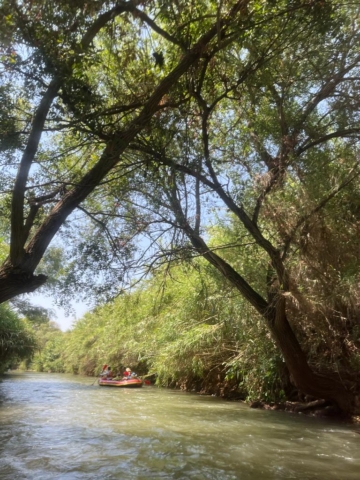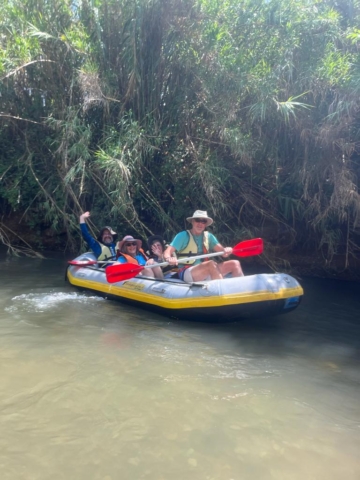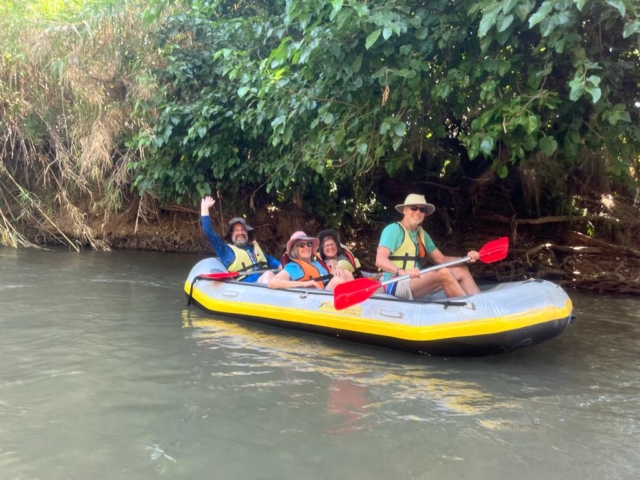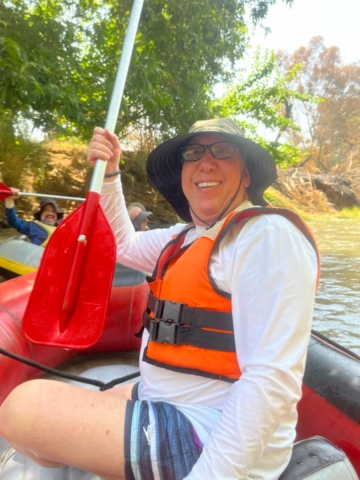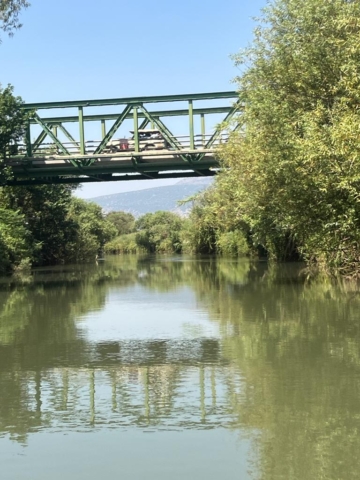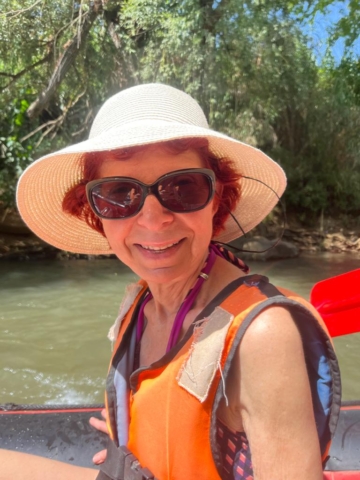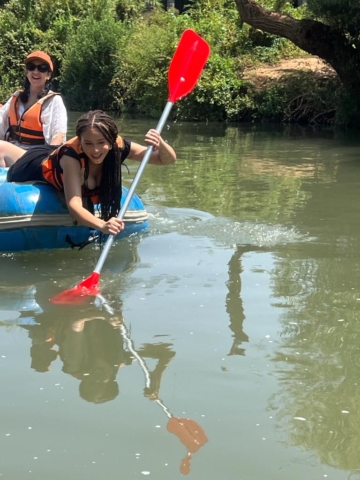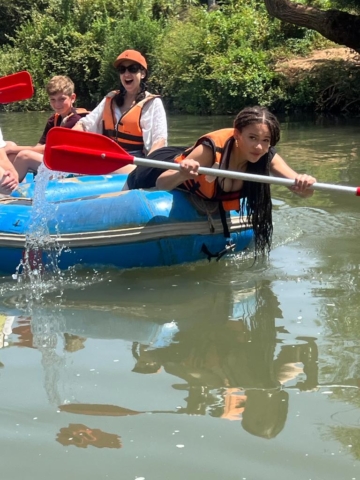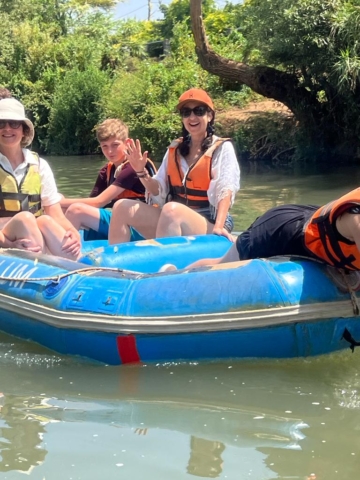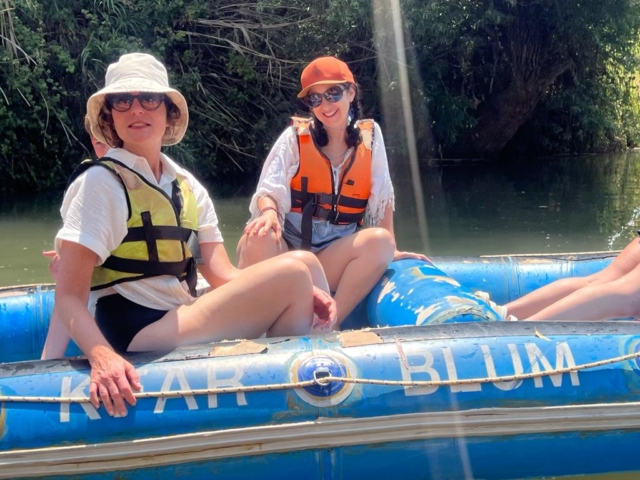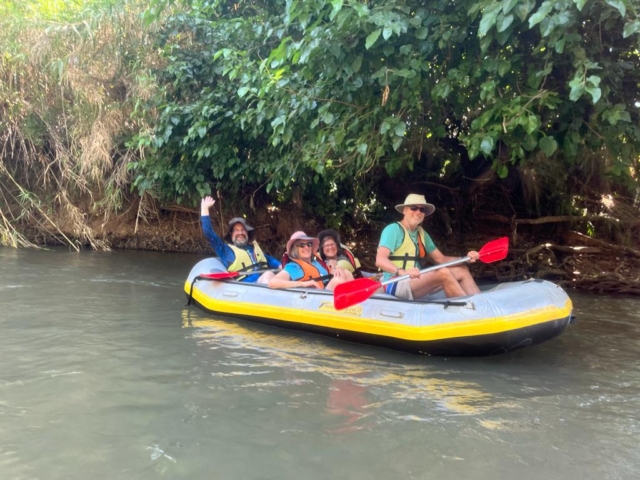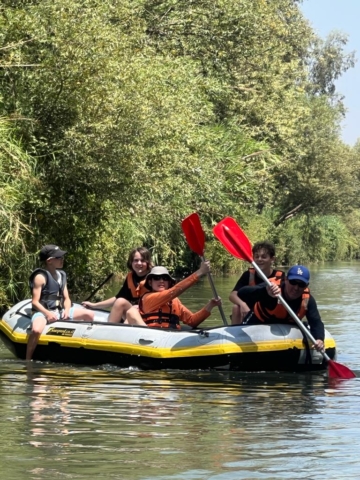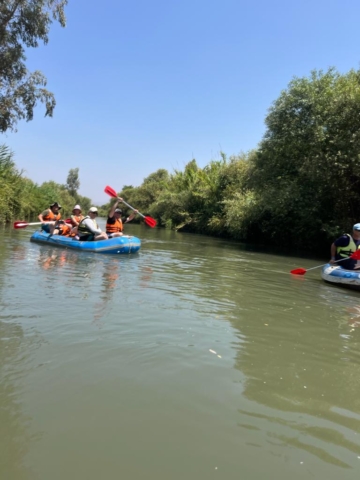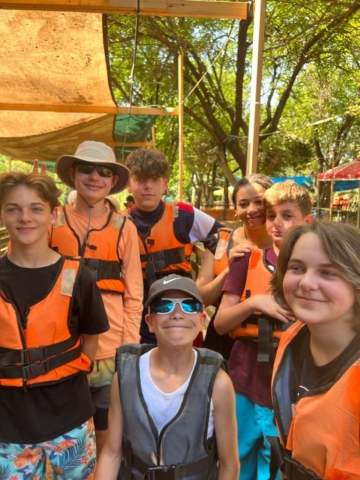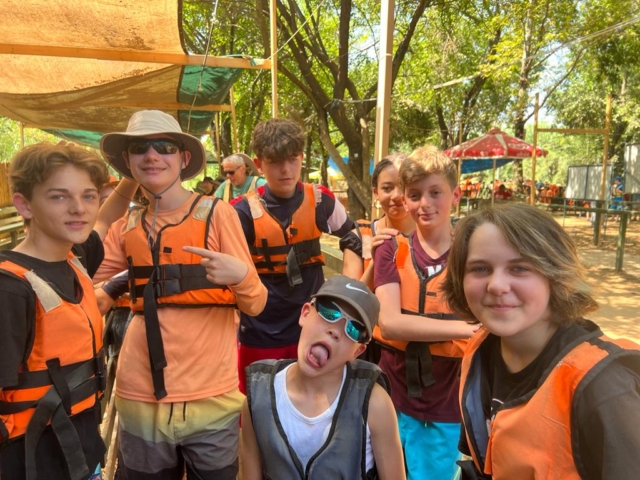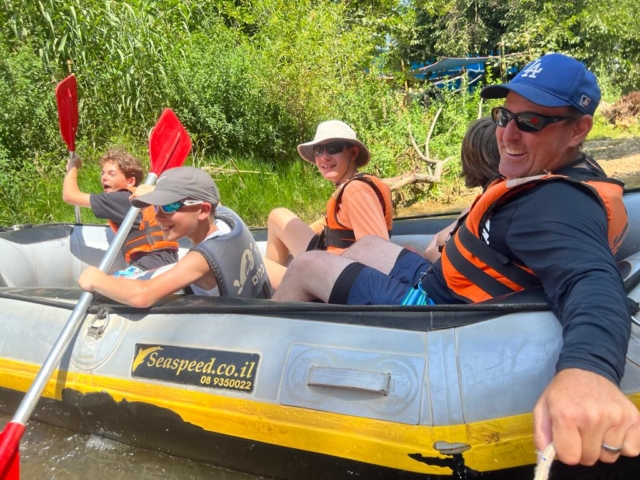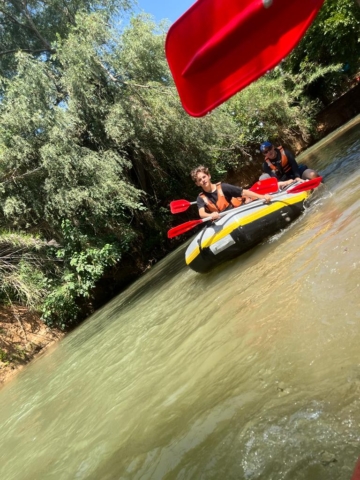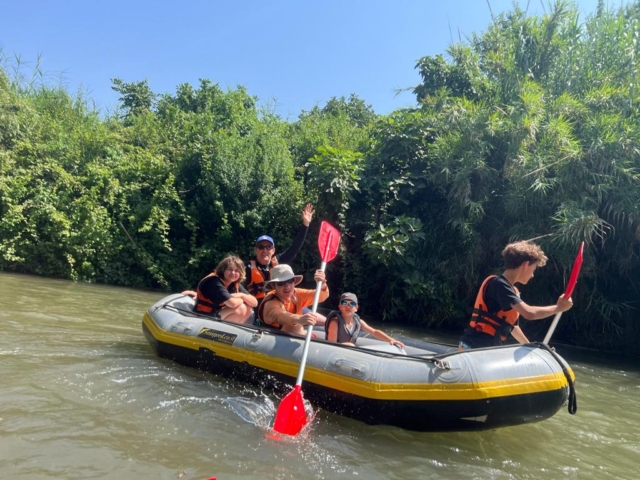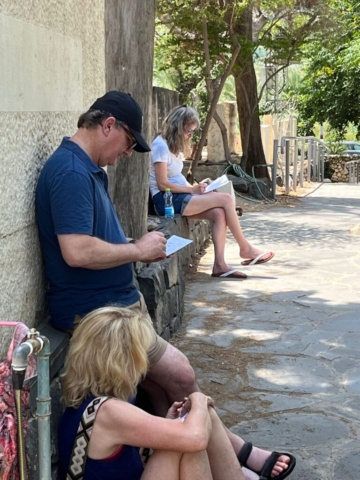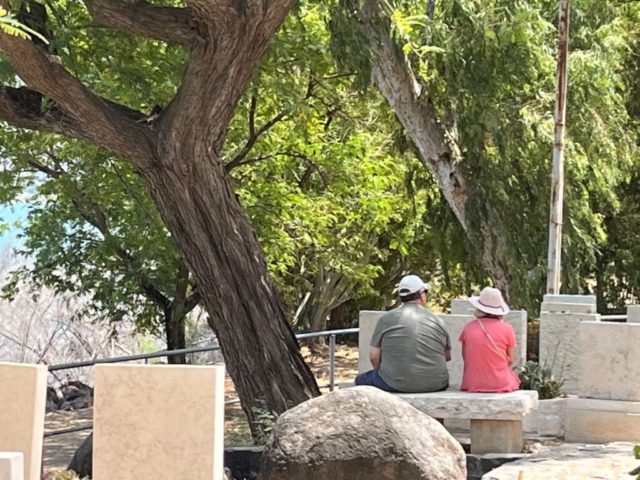Rebbe Nachman of Bratzlav, the 18th century Chassidic master, once gave a d’var Torah explaining why Moses had to descend down into the chaos of Egypt. Nachman said that we often have to descend in order to arise. It is true of many creative processes where we feel like we have made a mess before we organize it into something beautiful and meaningful. It was also true for use today.
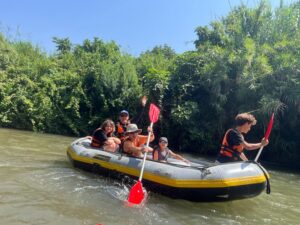 After leaving the Kibbutz, we drove down to a spot on the Jordan River. The word “Jordan” comes from the Hebrew word yored “descend.” The day before, we stood in the headwaters of the Jordan as the Dan spring leaked out and became the Dan River. But today, we see where those waters have gone. The answers is, “down south.” We joined those waters by climbing into our rafts and becoming human flotsam, at least for a bit. The Jordan river is cool to touch and flows smoothly for the most part,
After leaving the Kibbutz, we drove down to a spot on the Jordan River. The word “Jordan” comes from the Hebrew word yored “descend.” The day before, we stood in the headwaters of the Jordan as the Dan spring leaked out and became the Dan River. But today, we see where those waters have gone. The answers is, “down south.” We joined those waters by climbing into our rafts and becoming human flotsam, at least for a bit. The Jordan river is cool to touch and flows smoothly for the most part, 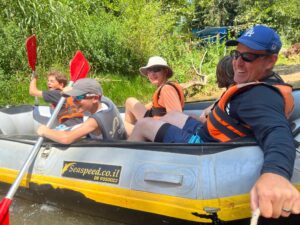 As it meanders, small roots and branches jut into our path, making it only slightly perilous to those of us who have not mastered the steering on a floating vehicle without a steering wheel. Some of us did bump along the shore a bit and then twirl helplessly like a confused dreidel in July, but we managed to thread that watery needle without too much difficulty. However, we did learn something shocking. We have pirates in our midst. I hesitate to call anyone out publicly, but when Andy Begun splashes his own rabbi and then other members of other boats floating by, there must be consequences. Thank goodness we didn’t have a plank that he could walk. It’s good that we are moving towards the High Holy Days. Hopefully, we will find it in our hearts to forgive him.
As it meanders, small roots and branches jut into our path, making it only slightly perilous to those of us who have not mastered the steering on a floating vehicle without a steering wheel. Some of us did bump along the shore a bit and then twirl helplessly like a confused dreidel in July, but we managed to thread that watery needle without too much difficulty. However, we did learn something shocking. We have pirates in our midst. I hesitate to call anyone out publicly, but when Andy Begun splashes his own rabbi and then other members of other boats floating by, there must be consequences. Thank goodness we didn’t have a plank that he could walk. It’s good that we are moving towards the High Holy Days. Hopefully, we will find it in our hearts to forgive him.
Aliyah
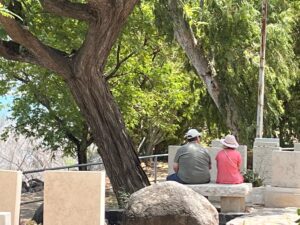 After we descended down the Jordan, we stopped at an unlikely place for a light, summer tour. We took some time to stop at the Kineret cemetery where we visited the grave of the great Israeli poet Rachel. She was one of the most influential poets of the Second Aliyah which took place from 1904-1914. She didn’t plan on moving to Israel, only visiting. But she was so deeply touched by the people she met on a trip to Israel that she stayed and became an expert in agriculture. When she contracted tuberculosis, her career as a kubbutznik had to end so that she wouldn’t infect the entire community, so she retreated to her room and expanded her poetry which is known to all Israelis at some level. Here is one of her selections after she had to give up her agricultural career on the kibbutz and curtail the rest of the ways she was contributing to the establishment of Israel.
After we descended down the Jordan, we stopped at an unlikely place for a light, summer tour. We took some time to stop at the Kineret cemetery where we visited the grave of the great Israeli poet Rachel. She was one of the most influential poets of the Second Aliyah which took place from 1904-1914. She didn’t plan on moving to Israel, only visiting. But she was so deeply touched by the people she met on a trip to Israel that she stayed and became an expert in agriculture. When she contracted tuberculosis, her career as a kubbutznik had to end so that she wouldn’t infect the entire community, so she retreated to her room and expanded her poetry which is known to all Israelis at some level. Here is one of her selections after she had to give up her agricultural career on the kibbutz and curtail the rest of the ways she was contributing to the establishment of Israel.
To My Land by Rachel
I cannot offer you, my land,
In praise, heroic deeds;
One tree I planted on the way
Which to the Jordan leads.
One narrow path to my feet yields,
Which runs across the fields.
I know how humble are the gifts
The child offers her mother:
A cry of joy one glorious day,
When shines the sun in splendor;
And, shed for you, a secret tear
To see the shabby clothes you wear.
Our guide, Uri, gave us some paper, some pens and some time to write our own words or pictures. Here are a few of them.
If Someone by Cole
If someone gave me the choice of God or money.
I would answer sincerely, it would not be funny.
God provides shelter and food for my family to feed,
Money provides selfishness and a little bit of greed.
God provides love to heal the sadness,
Money provides cars but too much would be madness.
God is full of truth while money is lies,
God keeps people together, money just makes goodbyes.
I would choose God and I’d choose it with purpose,
Money would kill me, drowning beneath life’s surface.
I think Cole would have fit perfectly into the socialistic kibbutzim of Rachel.
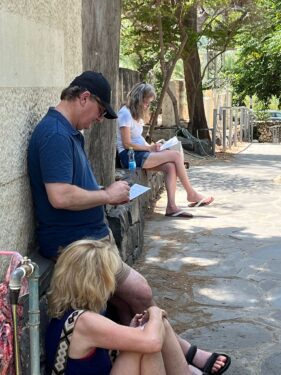 Here’s my submission called A Field of Stones
Here’s my submission called A Field of Stones
“A Field of Stones” A field of stones standing on end,
inscribed with our most persistent remnant,
Adam son of Adam
Bat daughter of Bat.
There are stones arrayed like plates in a restaurant
carrying the recipes of our ancestors
whose ongoing love will live in our bellies.
And there are stones we carry in our chests,
beating the rhythm of our lives.
We have but one question:
What will we write on our stone hearts?
Will it be, “Here is a person who has fun,
who consumes the world before being consumed themselves.
Or will we write, Here lies a person who mattered,
whose heart and life are worthy to be in a field of stones,
turned on their edges
and visited by those whose hearts are also uncarved stones.
Another Aliyah
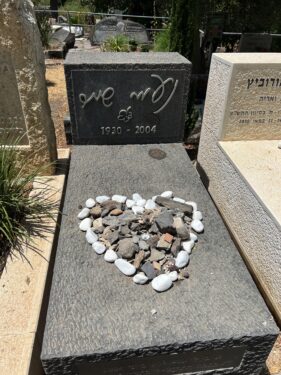 For our next Aliyah (remember, Aliyah means “ascent”), we traveled down the path of the Jordan River, down the Jordan River valley and turned right after we passed Jericho, that ancient city of biblical fame where Joshua, successor to Moses as leader of the Israelites, knocked down the walls through the blasting of shofars. Once we turned right, we began a slow, steady ascent up through the Judean Hills. We heard the story of Naomi Shemer, whose grave was just a few feet away from Rachel’s. Shemer was asked my Jerusalem mayor Teddy Kollek to write a song for the Israel Song Festival, not as a entry, just as a song to celebrate Israel’s nineteenths independence day. Jerusalem was still a divided city at that time with Jews not able to travel to the east side with the Old City and Temple Mount. Here words are filled with longing.
For our next Aliyah (remember, Aliyah means “ascent”), we traveled down the path of the Jordan River, down the Jordan River valley and turned right after we passed Jericho, that ancient city of biblical fame where Joshua, successor to Moses as leader of the Israelites, knocked down the walls through the blasting of shofars. Once we turned right, we began a slow, steady ascent up through the Judean Hills. We heard the story of Naomi Shemer, whose grave was just a few feet away from Rachel’s. Shemer was asked my Jerusalem mayor Teddy Kollek to write a song for the Israel Song Festival, not as a entry, just as a song to celebrate Israel’s nineteenths independence day. Jerusalem was still a divided city at that time with Jews not able to travel to the east side with the Old City and Temple Mount. Here words are filled with longing.
Jerusalem of Gold
The mountain air is clear as wine
And the scent of pines
Is carried on the breeze of twilight
With the sound of bells.
And in the slumber of tree and stone
Captive in her dream
The city that sits solitary
And in its midst is a wall.
Chorus:
Jerusalem of gold
And of copper, and of light
Behold I am a violin for all your songs.
x2
How the cisterns have dried
The market-place is empty
And no one frequents the Temple Mount
In the Old City.
And in the caves in the mountain
Winds are howling
And no one descends to the Dead Sea
By way of Jericho.
Chorus:
But as I come to sing to you today,
And to adorn crowns to you (i.e. to tell your praise)
I am the smallest of the youngest of your children (i.e. the least worthy of doing so)
And of the last poet (i.e. of all the poets born).
For your name scorches the lips
Like the kiss of a seraph
If I forget thee, Jerusalem,
Which is all gold…
Days later the Six-Days War broke out and that longing turned into embrace as we returned to Jerusalem again. She was asked to add a final verse and wrote:
We have returned to the cisterns
To the market and to the market-place
A ram’s horn calls out on the Temple Mount
In the Old City.
And in the caves in the mountain
Thousands of suns shine –
We will once again descend to the Dead Sea
By way of Jericho!
That last like, “by way of Jerico” should be translated “by the Jericho road,” the very road we were traveling on the very moment we heard her words. We had actually traveled through a tunnel at the time, our bus covered by darkness, smelling the rosemary that Uri had given us – rosemary is so prevalent in Jerusalem. As the final chorus rang out, we emerged from the tunnel and turned to our left — and we could see the golden dome over the Temple Mount. We had arisen. We had finally arrived.

